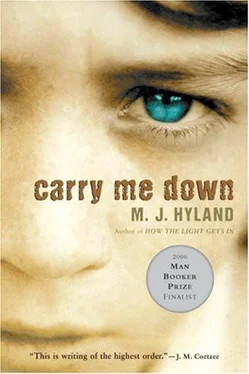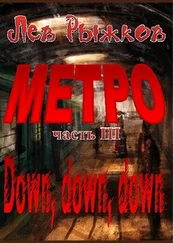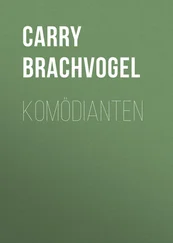‘If my mother is here, why can’t I see her?’ I ask.
‘She was here but we sent her home for some rest. She’ll be back later this afternoon. We need to sort out some paperwork first. We need to sign your discharge papers.’
‘Does that mean I’m leaving?’
‘Yes, but let’s take care of that business somewhere other than in the corridor.’
They sit at one side of the wobbling table and I sit at the other. The housefather does all the talking. I don’t have any thoughts about anything much except my nervous stomach.
‘Your mother says she doesn’t want to pursue any charges against you. She hasn’t been to bed. She was with the guards most of the night, and came in here this morning.’
I stare at him.
‘We need to sign you in, and this must be done quite formally, since you were unfit to sign anything last night.’
‘But why should I be signed in when I’m about to be signed out?’
‘Can you read?’
‘Of course I can read.’
‘Then read this, and if you agree to it, sign it, and then you’ll be free to go home with your mother, if that’s where she’d like to take you.’
‘Back home?’
‘Looks like it,’ says the housefather. ‘And you’d better stop rubbing your face. It muffles your words and you’ll end up with acne vulgaris.’
‘Acne vulgaris is …’ offers the social worker.
‘I know what it is.’
The two-sided discharge paper says that I was taken ‘involuntarily into the custody of the Department of Justice’ and that I am being ‘discharged by order of the same’; today’s date, a few names, something about ‘indemnification against damage to property’, and that’s about it.
I’d like to keep it as a souvenir.
‘So I can go now?’ I ask. ‘Back home?’
The social worker clears his throat. ‘Well, you can see your mother and I’ll be sitting in with you in the family room for a few minutes, just to be sure everything is ship-shape.’
‘Oh.’
* * *
At lunchtime, I sit in the dining room, with the social worker. There are seven tables, with five or six boys at each. They are between ten and seventeen years old, and make so much noise that every few minutes a man in a brown and green uniform walks down beside them and bangs two frying pans together, saying, ‘Who wants to lose their ears now? Who?’, but they all laugh and go back to the noise, including the man in the green and brown uniform. I’ve never been on a school camp, the kind that Americans have, but this must be what it’s like.
My appetite is back and I eat two helpings of mashed potato and sausages and two helpings of trifle. The social worker eats a cheese sandwich cut into triangles, and he takes small bites, the sharp, small bites that a rat might take. It is as though he is afraid of opening his mouth too wide.
‘If you had stayed here,’ he says, putting his sandwich down while he speaks, ‘you’d have enjoyed the meal on the first Sunday of every month.’
‘Why?’
‘The trainee chefs for the big hotels come in and try out their new recipes. Trainee chefs for posh hotels like the Shelbourne.’
‘I want to stay there one day.’
He ignores this.
‘And on Thursday nights there’s a billiards competition and on Saturday there are darts and table tennis.’
‘But after here the boys go to prison, don’t they?’
‘Some do. Some don’t.’
‘Would I have been charged with attempted murder if my mam had wanted to press charges?’
‘Very likely.’
‘I’m lucky, then.’
‘One of the luckiest boys I’ve ever met. Do you have any idea what your life might have become?’
‘I’d probably have been in prison.’
‘More likely you’d have spent a very long time in a psychiatric hospital for the criminally insane.’
‘Children don’t go there.’
He puts his sandwich down. ‘That’s true. But adolescents do.’
I stare at him.
‘Well then, I wouldn’t have gone there.’
‘Just count yourself lucky you have such a loving mother.’
I don’t want to talk about my mother, I want to see her. He doesn’t continue with his cheese sandwich and it stays there on the tray like something in a cartoon, with his tiny teeth marks in it. He looks at me, waiting for me to speak and when I don’t, he tells me to go my room to pack my bag.
I lie on the bed for a while, stare up at the ceiling, and hit the midges with the small softcover Bible that was in the bedside drawer.
At four o’clock the social worker comes in. ‘OK, they’re waiting for you.’
The family room is large, with three orange settees, a big television, a record player and two bookshelves filled mostly with magazines.
My mother stands up when I walk in. She has make-up on and her hair is plaited. She holds her arms out and I walk into her embrace, and she holds me and I smell the milky tea with sugar she must have had while she was waiting. I am happy.
‘I couldn’t do it,’ she says.
She lets go and stands back to look at me.
‘You’re my son, and I love you and I can’t see your life ruined. Your life will not be ruined. Your life will not be ruined. Not by you, and not by me. Your life will not be ruined. Do you understand?’
Her voice is strong and loud.
‘Yes,’ I say.
My father stands in the corner, holding two helium-filled balloons, both orange, the same as the colour of the settees.
‘And you’re sorry,’ he says without moving. ‘We know you’re sorry. Aren’t you?’
‘Yes,’ says my mother. ‘You’re sorry.’
They look at each other, and something seems settled. My mother collapses onto the settee and weeps silently. I stay standing; the social worker is standing behind me, breathing heavily but saying nothing.
I don’t want to sit. I want to leave. I look at my father; it is easier than looking at my mother. ‘What are the balloons for?’ I ask.
‘Something to hold me up,’ he says.
This must be a joke, but he doesn’t smile. ‘Oh,’ I say.
‘The balloons are for the twins,’ says my mother. ‘It’s their eighth birthday today. We’re going around to Aunty Evelyn’s house for tea. And we’ll stop on the way to pick up the cake. And we’ll not talk about what you did. And you’ll not say that you’ve been locked up here. What you did is forgotten and forgiven. There’s no other way.’
I smile at her but she doesn’t look at me; she looks at the floor.
‘It’s forgotten and forgiven,’ she continues, ‘and we will forget, and you will drop the nonsense about lie detection. There’s no point in ruining a perfectly good and promising life.’
I look at my father. I study his reaction to what my mother is saying. Maybe he has a punishment in store for me? His shoulders rise and fall with his breathing and, impatient but not angry, he moves the balloons from one hand to the other.
He looks at me. ‘We’re starting again,’ he says. ‘The three of us. We’re starting all over again.’
‘Are we going back to Gorey?’
‘Yes. We’ll leave tomorrow.’
‘Good,’ I say. ‘I want to go back.’
My mother gets up to leave and the social worker steps forward and asks her if she is ready to go.
‘Yes.’
‘And you’re sure?’
‘Yes.’
He opens the door and takes us down the hall to the front door. We stand to say goodbye on the footpath outside, by the car.
‘Thanks,’ I say. ‘Thanks for all your help.’
‘You’re very welcome,’ he says, putting his hands in his pockets.
‘Yes, thank you,’ says my father.
The social worker nods and turns away without saying goodbye. He walks towards the door of the home.
Читать дальше












